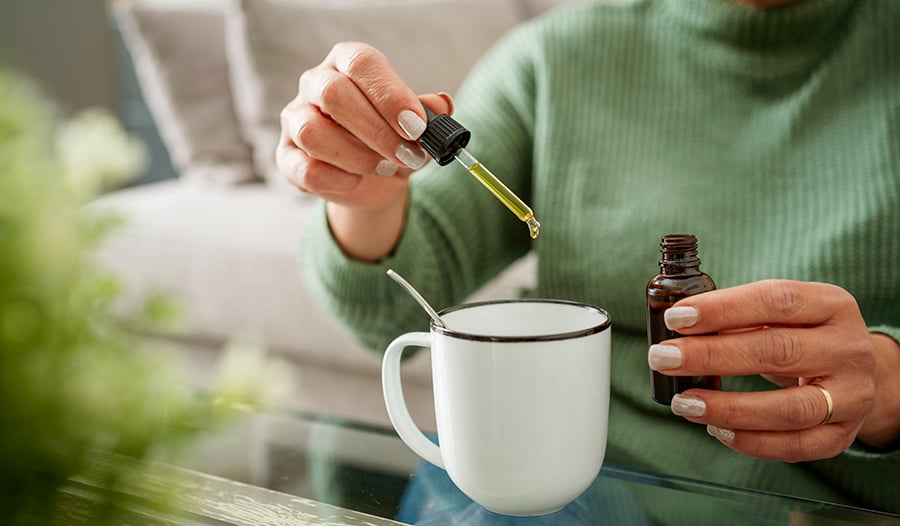5 beroligende urter for tarmhelse + nervesystemet

I disse dager ser det ut til at "tarmhelse" er overalt - fra velværepodcaster til supermarkedshyller. Men for oss i urteverdenen er det langt fra noen trend å støtte fordøyelsessystemet. Det er grunnleggende.
Som urtemedisiner tenker jeg ofte på tarmen som mer enn bare et fysisk system - det er et sensorisk system som er dypt forbundet med hvordan vi føler oss. Det enteriske nervesystemet, som noen ganger kalles "den andre hjernen", lever i tarmen og er i konstant kommunikasjon med hjernen over.1 Dette forholdet er kjent som tarm-hjerne-aksen, og det bidrar til å forklare hvorfor følelsesmessig stress så raskt kan føre til ubehag i fordøyelsen.2 Sommerfugler i magen før en presentasjon? Har du en stram magefølelse etter en tøff samtale? Dette er hverdagslige eksempler på hvordan stress og fordøyelse henger nøye sammen.
Det er her urter kan være nyttige, særlig de som støtter både nervesystemet og fordøyelsen. I urtemedisinen bruker vi ofte planter som kalles nervemedisiner, som bidrar til å gjenopprette balanse og lette spenninger.3 Når disse nervinene også har karminative eller krampeløsende egenskaper - det vil si at de støtter fordøyelsen ved å lindre spenninger og milde kramper samtidig som de lindrer oppblåsthet og ubehag,4 blir de kraftfulle allierte for velvære for hele kroppen.
I denne artikkelen vil jeg dele fem av mine favoritturter som gjør nettopp det - beroliger sinnet samtidig som de lindrer fordøyelsesproblemer. Men la oss først snakke litt mer om nervesystemet.
Hva er nerver?
Nervines er urter som støtter nervesystemet på en skånsom og naturlig måte.3 De kan bidra til å fremme en følelse av ro, støtte avslapning og lindre symptomene som følger med sporadisk stress, som mental anspenthet, muskelspenninger eller tankemylder.
Nerver finnes i mange former. Noen virker mildt beroligende, andre dypt avslappende, og noen har til og med en oppløftende effekt. De brukes ofte for å støtte en avslappende søvn, hjelpe med sporadiske engstelige tanker eller lette spenningen som kan sette seg i både kropp og sinn.5
Noen nervemedisiner er også utrolig nyttige for å støtte fordøyelsessystemet.6 Det er fordi nervesystemet og fordøyelsessystemet er nært knyttet sammen, og når det ene er i ubalanse, er ofte det andre det også.7 Vi kan dra nytte av denne sammenhengen ved å velge urter som virker på begge systemene samtidig.8
5 urter som beroliger magen og roer sinnet
Her er fem urter jeg ofte anbefaler når både stress og fordøyelse trenger litt kjærlighet:
1. Peppermynte (Mentha × piperita)
Peppermynte er et kraftverk for fordøyelsen. Den er avkjølende, oppkvikkende og rik på eteriske oljer9 som kan bidra til å slappe av de glatte musklene i fordøyelseskanalen10og lindrer luft i magen, oppblåsthet og kvalme. Peppermynte har milde nervestimulerende egenskaper på grunn av sin stimulerende effekt på nervesystemet.11 Det er spesielt nyttig etter et tungt måltid eller når spenningen ser ut til å sette seg i magen.12
2. Kamille (Matricaria chamomilla)
Kamille er en klassiker med god grunn. De fleste forbinder det med avslapping, og de tar ikke feil. Denne lille, men mektige blomsten er en av de mest brukte nervøse urtene rundt.13 Det er skånsomt nok for barn14 og støttende nok for voksne, spesielt de med en "nervøs mage".15
I urtemedisinen er kamille kjent for å berolige fordøyelsessystemet, lette anspenthet og støtte sunn søvn.16 Kamille er spesielt nyttig for dem som bærer stresset i magen, og som opplever ting som sommerfugler, anspenthet eller fordøyelsesproblemer i følelsesladde perioder. Jeg tenker alltid på scenen i Peter Kanin der Peters mor gir ham kamillete etter en spesielt stressende dag - det er et tidløst middel.17
3. Lavendel (Lavandula angustifolia)
Lavendel forbindes ofte med sin vakre duft, men den er mye mer enn bare en vakker aroma. Lavendel har lenge vært brukt i tradisjonelle urtesystemer for å støtte nervesystemet og redusere stressrelaterte symptomer.18 I de senere årene har man til og med studert effekten av lavendel på humøret og den emosjonelle balansen.19
Lavendelens eteriske oljer har også karminative egenskaper, noe som bidrar til å berolige fordøyelseskanalen og lindre luft i magen og oppblåsthet.20 Det er en dypt avslappende urt som kan støtte både sinnet og tarmen i øyeblikk av overveldelse.21
4. Sitronmelisse (Melissa officinalis)
Sitronmelisse er en fryd å dyrke og enda mer en fryd å bruke. Den lyse, sitronaktige aromaen fra myntefamilien har en nesten umiddelbart beroligende effekt.22 Det er en av mine favoritturter for å støtte humøret, fremme avslapning,23 og forsiktig oppløfte ånden.24
Tradisjonelt har sitronmelisse også blitt brukt for å berolige fordøyelsessystemet og lette nervøse spenninger som manifesterer seg i magen. Det hjelper mot sporadisk angst, rastløshet og den "knute i magen"-følelsen vi alle har opplevd på et eller annet tidspunkt.25
Det latinske navnet Melissa betyr "honningbie" på gresk - denne planten er elsket av både pollinatorer og urtemedisinere.26
5. Skullcap (Scutellaria lateriflora)
Skullcap er en av de mest beroligende urtene i den vestlige materia medica.27 Skullcap, som også tilhører myntefamilien, brukes ofte til å støtte nervesystemet i perioder med økt spenning eller når kroppen føler seg fastlåst i en "kamp- eller fluktmodus".28
Det som gjør hodeskalle så spesiell, er dens evne til å få både kropp og sinn til å slappe av. Det brukes av urtemedisiner for å hjelpe med sporadiske engstelige tanker, muskelspenninger og søvnforstyrrelser.29 Den støtter også det parasympatiske nervesystemet - "hvile- og fordøyelsesdelen" av fysiologien vår, noe som gjør den til en utmerket urt for å regulere tarm-hjerne-aksen30 og bringe kroppen tilbake til en tilstand av letthet.
Fordeler med urtete
En av de enkleste og mest behagelige måtene å ta nervøse urter på er i form av te . Ritualet med å lage te - koke vann, trekke urter og ta en pause - kan være helbredende i seg selv.31 Og når urtene i koppen er valgt for å støtte både fordøyelsen og sinnet, blir det en dypt nærende daglig praksis.
Hvis du akkurat har begynt å utforske urtebasert støtte, bør du begynne med det du kjenner til. Urter som peppermynte og kamille finnes ofte i spiskammerset eller på lokale markeder, og er et godt sted å begynne. Føler du deg sliten og oppblåst etter en lang dag? En blanding av kamille og lavendel kan være akkurat det rette. 32. Leter du etter noe som kan løfte humøret samtidig som du får ro i magen? Sitronmelisse og hodeskalle skaper en velduftende og beroligende kombinasjon.
Du trenger ikke en komplisert rutine - bare noen få, bevisste øyeblikk og de rette urteallierte kan utgjøre en meningsfull forskjell.
Avsluttende tanker
Herbalisme er både en kunst og en vitenskap. Selv om vi bare så vidt har begynt å forstå kompleksiteten i sammenhengen mellom tarm og hjerne, har urtemedisinere lenge visst at det å berolige magen ofte beroliger sinnet - og vice versa. Urtene jeg har delt her, er velprøvde og dypt støttende for de sammenkoblede systemene som bærer oss gjennom dagene våre.
Jeg oppfordrer deg til å nærme deg disse urtene med nysgjerrighet, intensjon og omtanke. En kopp te kan virke enkel, men i denne enkelheten ligger det en kraftig påminnelse: Vi kan støtte kroppen vår, ikke ved å overstyre den, men ved å lytte - og respondere - med mildhet.
Som alltid er det viktig å rådføre seg med helsepersonell før man begynner å bruke nye urter, spesielt hvis man er gravid, ammer eller bruker medisiner.
Denne artikkelen er kun ment for opplysningsformål og har ikke til hensikt å diagnostisere, behandle, kurere eller forebygge noen sykdom. Rådfør deg alltid med kvalifisert helsepersonell før du gjør endringer i helserutinen din.
Referanser:
- Carabotti M, Scirocco A, Maselli MA, Severi C. The gut-brain axis: interactions between enteric microbiota, central and enteric nervous systems. Ann Gastroenterol. 2015;28(2):203-9.
- Mayer EA, Nance K, Chen S. Tarm-hjerne-aksen. Annu Rev Med. 2022;73:439-53.
- Walter G, Rey JM. Relevansen av urtebehandlinger for psykiatrisk praksis. Aust N Z J Psychiatry. 1999;33(4):482-9; diskusjon 90-3.
- Saller R, Iten F, Reichling J. [Dyspeptiske smerter og fytoterapi - en gjennomgang av tradisjonelle og moderne urtemedisiner]. Forsch Komplementarmed Klass Naturheilkd. 2001;8(5):263-73.
- Abascal K, Yarnell E. Nervøse urter for behandling av angst. Alternative og komplementære behandlingsformer. 2004;10(6):309-15.
- Hoffmann D. Sunn fordøyelse: En naturlig tilnærming til å lindre fordøyelsesbesvær, gass, halsbrann, forstoppelse, kolitt og mer: Hachette+ ORM; 2017.
- Abascal K, Yarnell E. Kombinasjon av urter i en formel mot irritabel tarm-syndrom. Alternative og komplementære behandlingsformer. 2005;11(1):17-23.
- Kelber O, Bauer R, Kubelka W. Fytoterapi ved funksjonelle gastrointestinale forstyrrelser. Dig Dis. 2017;35 Suppl 1:36-42.
- Ingrosso MR, Ianiro G, Nee J, Lembo AJ, Moayyedi P, Black CJ, et al. Systematisk oversikt og metaanalyse: effekt av peppermynteolje ved irritabel tarm-syndrom. Aliment Pharmacol Ther. 2022;56(6):932-41.
- Hills JM, Aaronson PI. Peppermynteoljens virkningsmekanisme på glatt muskulatur i mage-tarmkanalen. En analyse ved hjelp av patch clamp-elektrofysiologi og isolert vevsfarmakologi hos kanin og marsvin. Gastroenterologi. 1991;101(1):55-65.
- Meamarbashi A, Rajabi A. Effekten av peppermynte på treningsprestasjoner. Tidsskrift for International Society of Sports Nutrition. 2013;10:1-6.
- McKay DL, Blumberg JB. En gjennomgang av bioaktiviteten og de potensielle helsefordelene ved peppermynte-te (Mentha piperita L.). Phytother Res. 2006;20(8):619-33.
- Alexieva IN, Popova AT, Mihaylova DS. Trender i bruk av urter - en spørreundersøkelse. Matforskning. 2020;4(2):500-6.
- Sorme FM, Tabarrai M, Alimadady H, Rahimi R, Sepidarkish M, Karimi M. Effekten av Matricaria chamomilla L. ved spedbarnskolikk: En dobbeltblind, placebokontrollert randomisert studie. J Pharm Res Int. 2019;31:1-11.
- Sarkar M, Chawla P. Helbredende egenskaper av kamille i gastrointestinale lidelser. Urter, krydder og medisinplanter for gastrointestinale lidelser hos mennesker: Apple Academic Press; 2022. s. 125-40.
- McKay DL, Blumberg JB. En gjennomgang av bioaktiviteten og de potensielle helsefordelene ved kamillete (Matricaria recutita L.). Phytother Res. 2006;20(7):519-30.
- Potter B. Fortellingen om Peter kanin: Baker's Plays; 1990.
- Koulivand PH, Khaleghi Ghadiri M, Gorji A. Lavendel og nervesystemet. Evidensbasert komplementær og alternativ medisin. 2013;2013(1):681304.
- Bazrafshan MR, Jokar M, Shokrpour N, Delam H. Effekten av lavendel urtete på angst og depresjon hos eldre: En randomisert klinisk studie. Complement Ther Med. 2020;50:102393.
- Cavanagh HMA, Wilkinson JM. Eterisk lavendeloljes biologiske aktiviteter. Fytoterapiforskning. 2002;16(4):301-8.
- Baker J, Brown K, Rajendiran E, Yip A, DeCoffe D, Dai C, et al. Medisinsk lavendel modulerer den enteriske mikrobiotaen for å beskytte mot Citrobacter rodentium-indusert kolitt. Am J Physiol Gastrointest Liver Physiol. 2012;303(7):G825-36.
- Lotfi A, Shiri H, Ilkhani R, Sefidkar R, Esmaeeli R. Effekten av aromaterapi med Melissa officinalis for å redusere angst hos hjertepasienter: En randomisert klinisk studie. Crescent Journal of Medical & amp; Biological Sciences. 2019;6(3).
- Kennedy DO, Little W, Scholey AB. Demping av laboratorieindusert stress hos mennesker etter akutt administrering av Melissa officinalis (sitronmelisse). Biopsykososial vitenskap og medisin. 2004;66(4):607-13.
- Ghazizadeh J, Sadigh-Eteghad S, Marx W, Fakhari A, Hamedeyazdan S, Torbati M, et al. Effekten av sitronmelisse (Melissa officinalis L.) på depresjon og angst i kliniske studier: En systematisk gjennomgang og metaanalyse. Forskning på fytoterapi. 2021;35(12):6690-705.
- Shakeri A, Sahebkar A, Javadi B. Melissa officinalis L. - En gjennomgang av tradisjonell bruk, fytokjemi og farmakologi. Tidsskrift for etnofarmakologi. 2016;188:204-28.
- Watts DC. Ordbok i plantelære: Elsevier; 2007.
- Upton R, Dayu RH. Skullcap Scutellaria lateriflora L.: et amerikansk nervemiddel. Tidsskrift for urtemedisin. 2012;2(3):76-96.
- Brock C, Whitehouse J, Tewfik I, Towell T. American Skullcap (Scutellaria lateriflora): en randomisert, dobbeltblind, placebokontrollert crossover-studie av dens effekter på humøret hos friske frivillige. Phytother Res. 2014;28(5):692-8.
- Brock C, Whitehouse J, Tewfik I, Towell T. Bruken av Scutellaria lateriflora: en pilotundersøkelse blant utøvere av urtemedisin. Tidsskrift for urtemedisin. 2012;2(2):34-41.
- Liaqat H, Parveen A, Kim S-Y. Antidepressiv effekt av naturlige produkter og deres derivater rettet mot BDNF-TrkB i tarm-hjerne-aksen. Internasjonalt tidsskrift for molekylære vitenskaper. 2022;23(23):14968.
- Dow C. Teens helbredende kraft: enkle teer og tisaner for å avhjelpe og forynge helsen din: Llewellyn Worldwide; 2014.
- Ebrahimi H, Mardani A, Basirinezhad MH, Hamidzadeh A, Eskandari F. Effekten av aromaterapi med inhalasjon av eteriske oljer fra lavendel og kamille på depresjon, angst og stress hos eldre hjemmeboende personer: En randomisert kontrollert studie. Explore (NY). 2022;18(3):272-8.
ANSVARSFRASKRIVELSE:Velværesenteret har ikke til hensikt å gi diagnoser ...
















































































 Innholdsfortegnelse
Innholdsfortegnelse

